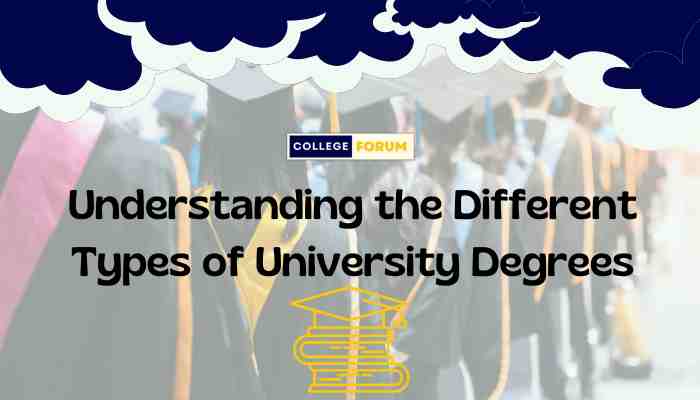Understanding the Different Types of University Degrees
Deciding to pursue higher education is a monumental step, and understanding the different types of university degrees is crucial to making an informed decision. Whether you’re fresh out of high school or considering a career change, this guide will help you navigate the varied landscape of degree programs. In this comprehensive article, we’ll explore the different levels and types of degrees available, their benefits, and how they align with your career goals. By the end, you’ll have a clearer understanding of the options available to you, making your journey through academia smoother and more focused.
1. Understanding Degree Levels
University degrees are categorized into various levels based on the complexity and depth of study. The main levels include:
 1.1 Associate Degrees
1.1 Associate Degrees
Associate degrees are typically two-year programs offered at community colleges and some universities. They provide foundational knowledge and are often stepping stones to bachelor’s degrees. Key types include:
- Associate of Arts (AA): This degree focuses on general education in the arts and humanities and provides a foundation for transferring to a four-year university.
- Associate of Science (AS): Similar to an AA, but with an emphasis on scientific and technical disciplines. It’s ideal for students planning to pursue STEM fields.
- Associate of Applied Science (AAS): This is a more vocational degree that prepares students for immediate employment in fields like nursing, information technology, and paralegal studies.
1.2 Bachelor’s Degrees
Bachelor’s degrees are four-year programs that offer a comprehensive education in a specific field. Common types include:
- Bachelor of Arts (BA): This degree focuses on liberal arts, humanities, and social sciences, providing a broad education with opportunities for specialization.
- Bachelor of Science (BS): This degree focuses on science and technical fields, providing a strong foundation in areas like mathematics, engineering, and technology.
- Bachelor of Fine Arts (BFA): A specialized degree for students pursuing careers in visual and performing arts, such as painting, sculpture, or theater.
- Bachelor of Business Administration (BBA): This degree focuses on business and management principles, preparing students for careers in finance, marketing, and entrepreneurship.
1.3 Master’s Degrees
Master’s degrees typically require one to two years of study beyond a bachelor’s degree. They provide specialized knowledge and skills in a particular area. Common types include:
- Master of Arts (MA): An advanced degree in the arts, humanities, or social sciences, focusing on theoretical and analytical skills.
- Master of Science (MS): An advanced degree in science and technical fields, often requiring a research project or thesis.
- Master of Business Administration (MBA): A professional degree focusing on business management and leadership, often pursued by professionals seeking career advancement.
- Master of Fine Arts (MFA): A terminal degree in the creative arts, focusing on professional practice and creative development.
1.4 Doctoral Degrees
Doctoral degrees are the highest level of academic degrees and can take several years to complete. The two main types are:
- Doctor of Philosophy (PhD): A research-focused degree in various fields, emphasizing original contributions to knowledge through a dissertation.
- Professional Doctorates (e.g., MD, JD, EdD): These degrees focus on professional practice in fields like medicine, law, and education, emphasizing practical skills and expertise.
2. Types of Degrees by Field of Study
Degrees are also categorized based on fields of study, allowing students to specialize in areas that align with their interests and career aspirations. Let’s look at some of the main types:
 2.1 Arts and Humanities Degrees
2.1 Arts and Humanities Degrees
Degrees in this category focus on culture, history, languages, and the arts. They encourage critical thinking, creativity, and communication skills. Examples include:
- English: This degree focuses on literature, writing, and critical analysis, preparing students for careers in writing, editing, and education.
- History: This degree explores past events, societies, and cultures, developing research and analytical skills for careers in academia, archiving, and law.
- Philosophy: This degree examines fundamental questions about existence, ethics, and knowledge, honing critical thinking skills for careers in academia, law, and public policy.
- Fine Arts: This degree focuses on creative expression in visual and performing arts, preparing students for careers as artists, performers, and designers.
2.2 Science and Mathematics Degrees
Science and mathematics degrees emphasize analytical and problem-solving skills. Common examples are:
- Biology: This degree studies living organisms and their environments, leading to careers in research, healthcare, and environmental science.
- Physics: This degree explores the fundamental laws of nature, preparing students for careers in research, engineering, and technology.
- Mathematics: This degree focuses on mathematical theory and applications, leading to careers in finance, data science, and academia.
- Chemistry: This degree studies the composition and properties of substances, preparing students for careers in research, pharmaceuticals, and chemical engineering.
2.3 Social Sciences Degrees
Social sciences explore human behavior and societies. They are ideal for students interested in understanding societal structures and relationships. Key examples include:
- Psychology: This degree studies the mind and behavior, preparing students for careers in counseling, research, and human resources.
- Sociology: This degree examines societal structures and interactions, leading to careers in social work, public policy, and research.
- Political Science: This degree explores government systems, political behavior, and public policy, preparing students for careers in politics, law, and diplomacy.
- Economics: This degree analyzes the production, distribution, and consumption of goods and services, leading to careers in finance, public policy, and academia.
2.4 Business and Management Degrees
These degrees focus on organizational skills, economics, and leadership. Examples include:
- Business Administration: This degree covers a broad range of business topics, preparing students for management roles in various industries.
- Accounting: This degree focuses on financial reporting, auditing, and taxation, leading to careers as accountants, auditors, and financial analysts.
- Marketing: This degree studies market research, consumer behavior, and advertising, preparing students for careers in marketing, sales, and public relations.
- Finance: This degree explores financial management, investments, and markets, leading to careers in banking, investment, and financial planning.
2.5 Health Sciences Degrees
Health sciences degrees prepare students for careers in healthcare. They include:
- Nursing: This degree prepares students to become registered nurses, providing patient care and promoting health in various settings.
- Public Health: This degree focuses on community health, disease prevention, and health policy, leading to careers in public health administration, epidemiology, and health education.
- Pharmacy: This degree prepares students to become pharmacists, focusing on medication management and patient care.
- Physical Therapy: This degree prepares students to become physical therapists, providing rehabilitation and therapy for patients with physical injuries or disabilities.
2.6 Engineering and Technology Degrees
These degrees combine science and mathematics to solve real-world problems. Common fields are:
- Mechanical Engineering: This degree focuses on designing and manufacturing mechanical systems, preparing students for careers in engineering, manufacturing, and robotics.
- Computer Science: This degree studies computer systems and software development, leading to careers in software engineering, data science, and information technology.
- Electrical Engineering: This degree focuses on electrical systems and technology, preparing students for careers in electronics, telecommunications, and power systems.
- Information Technology: This degree focuses on managing and implementing technology systems, preparing students for careers in IT management, cybersecurity, and systems administration.
2.7 Education Degrees
Education degrees prepare students for teaching and educational administration roles. Examples include:
- Elementary Education: This degree prepares students to teach young children, focusing on child development, curriculum design, and classroom management.
- Secondary Education: This degree prepares students to teach adolescents, focusing on subject-specific pedagogy and adolescent development.
- Special Education: This degree prepares students to teach children with disabilities, focusing on individualized instruction and inclusive education.
- Educational Leadership: This degree prepares students for administrative roles in education, focusing on school management, policy, and leadership.
3. Specialized Degrees and Interdisciplinary Studies
 3.1 Specialized Degrees
3.1 Specialized Degrees
Specialized degrees offer focused education in specific areas, providing in-depth knowledge and skills for niche careers. Examples include:
- Architecture: This degree focuses on designing and constructing buildings and environments, leading to careers as architects, urban planners, and interior designers.
- Journalism: This degree focuses on reporting, writing, and multimedia communication, preparing students for careers in journalism, media, and public relations.
- Environmental Science: This degree studies the environment and ecological systems, preparing students for careers in environmental consulting, conservation, and sustainability.
3.2 Interdisciplinary Studies
Interdisciplinary degrees allow students to combine multiple fields, offering a broad-based education that fosters creativity and innovation. Examples include:
- International Studies: This degree explores global issues, cultures, and politics, preparing students for careers in diplomacy, international business, and global development.
- Cognitive Science: This degree studies the mind and intelligence, combining elements of psychology, neuroscience, and computer science for careers in research, artificial intelligence, and human-computer interaction.
- Environmental Studies: This degree explores environmental issues from multiple perspectives, preparing students for careers in environmental policy, advocacy, and management.
4. Benefits of Different Types of University Degrees
Choosing the right degree offers various benefits, including:
 4.1 Career Opportunities
4.1 Career Opportunities
Different degrees align with specific career paths, opening doors to various job markets. For example, a degree in engineering can lead to jobs in technology and manufacturing, while a degree in business can lead to jobs in finance and management.
4.2 Personal Growth
Higher education fosters critical thinking, communication, and problem-solving skills, contributing to personal development. For example, a degree in philosophy can enhance analytical thinking, while a degree in communication can improve interpersonal skills.
4.3 Networking
University programs provide opportunities to connect with professionals, peers, and mentors, building valuable networks for career development. For example, a degree in law can provide connections with legal professionals, while a degree in education can connect students with experienced teachers and administrators.
4.4 Specialized Knowledge
Specialized degrees provide in-depth knowledge in a specific area, enhancing expertise and employability. For example, a degree in computer science provides skills in programming and software development, while a degree in nursing provides skills in patient care and health management.
5. Choosing the Right Degree
Choosing the right degree requires careful consideration of several factors, including:
 5.1 Interests and Passions
5.1 Interests and Passions
Selecting a degree aligned with your interests ensures motivation and satisfaction. For example, if you love solving problems and working with technology, a degree in engineering or computer science may be a good fit.
5.2 Career Goals
Consider degrees that align with your long-term career aspirations. For example, if you want to become a teacher, a degree in education is essential, while if you want to work in finance, a degree in business or economics may be more appropriate.
5.3 Job Market
Research the job market demand for different degrees to ensure employability after graduation. For example, degrees in healthcare and technology are often in high demand, while degrees in certain arts and humanities fields may have more limited job prospects.
5.4 Flexibility
Some degrees offer broader career options, while others are more specialized. Consider your need for flexibility in career choices. For example, a degree in business administration provides a wide range of career options, while a degree in nursing is more specialized but offers strong job security.
6. Conclusion
In conclusion, understanding the different types of university degrees is essential for making informed decisions about your academic and career future. Whether you’re interested in arts, sciences, business, or technology, there’s a degree that aligns with your passions and goals. By exploring the different levels and fields of study, you can select a degree that best suits your aspirations and sets you on a path to success.
Remember, the right degree is one that not only aligns with your career goals but also fuels your passions and curiosity, making your educational journey enjoyable and rewarding. Whether you pursue a bachelor’s, master’s, or doctoral degree, the key is to choose a path that resonates with you and supports your long-term objectives.
By understanding your options and carefully considering your interests and goals, you can confidently embark on your higher education journey, equipped with the knowledge to make the best choices for your future. If you want to explore more and want best university for your career you can contact to college forum team where you will get consult by professional career counselor.

